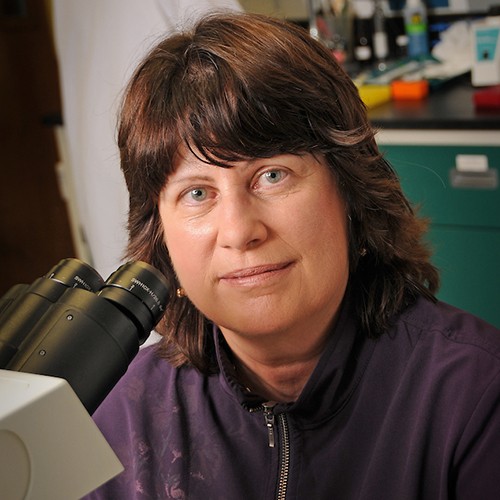JoAnn Burkholder, William Neal Reynolds Distinguished Professor of Applied Ecology and Director of the Center for Applied Aquatic Ecology at North Carolina State University, will deliver the thirty-sixth Odum Lecture at the University of Georgia Odum School of Ecology. Her talk, “Going the Wrong Way on Cultural Eutrophication,” will take place at 4:00 p.m. on Tuesday, April 12, in the Odum School auditorium and via Zoom. The lecture is followed by a reception, and is free and open to the public. To receive the Zoom link, please fill out this form to sign up for the EcoSeminar listserv.
Burkholder’s research focuses on the effects of nutrient pollution on aquatic ecosystems, the ecology of harmful algae, and use of long-term datasets to quantify and track trends in nutrient contamination of freshwaters and estuaries.
In the early 1990s, Burkholder and her students discovered that a previously unknown dinoflagellate, Pfiesteria piscicida, was responsible for a series of massive fish kills in North Carolina’s Neuse River estuary and other southeastern rivers. Their research also indicated that exposure to Pfisteria was harmful to humans, causing symptoms that included sores, nausea, and memory loss, and linked Pfisteria outbreaks to polluted runoff from agricultural and urban sources. While officials were initially reluctant to accept Burkholder’s findings, her work eventually motivated stronger pollution control measures in North Carolina. The story of how Burkholder and her team made their discovery was the subject of the New York Times bestselling book “And the Water Turned to Blood” by investigative journalist Rodney Barker.
“JoAnn Burkholder is internationally renowned for her pioneering work on the causes and ecological consequences of harmful algal and cyanobacterial blooms,” said Catherine Pringle, Distinguished Research Professor of Ecology at the Odum School. “Moreover, her research has been essential to our current understanding of the chronic effects of nutrient over-enrichment on the plant base of aquatic ecosystems.”
As director of the NC State Center for Applied Aquatic Ecology, Burkholder leads ongoing research and monitoring programs on the Neuse Estuary and three major water supply reservoirs in North Carolina. She and her team developed instruments to conduct automated water quality sampling to track environmental changes, examine the ecology of harmful algae, and improve assessment of the causes of fish kills. They are using this technology to detect toxic cyanobacteria, microbial pathogens, pesticides and other chemical contaminants, and to improve early warning systems to safeguard public water supplies.
In addition, Burkholder frequently assists concerned citizens groups by providing scientific expertise on water quality issues. She has been invited to testify before Congress on issues involving water quality and harmful algae, and has served on several governor-appointed policy boards directed toward aquatic resource protection.
Burkholder’s talk will focus on her career-long efforts to understand and minimize chronic, insidious impacts of cultural eutrophication—nutrient pollution caused by human activities—on aquatic ecosystems, using examples from her research experiences in freshwater, estuarine and marine systems. She will also discuss how policy decisions have failed at protecting the nation’s waterways from the impacts of nutrient pollution, and suggest a path forward that offers hope for improvement.
Burkholder has received numerous honors in recognition of her scholarship and service. A Fellow of the American Association for the Advancement of Science, in 1998 she was awarded the AAAS Scientific Freedom and Responsibility Award and was also named Conservationist of the year by the National Wildlife Federation and by the Governor of North Carolina. She was a Pew Fellow in Marine Conservation and a Fellow of the Ecological Society of America’s Aldo Leopold Partnership Program. She has authored or co-authored more than 180 peer-reviewed publications and her work has been supported by the National Science Foundation, National Park Service, U.S. Environmental Protection Agency, National Oceanic and Atmospheric Administration, U.S. Department of Defense, the Burroughs Wellcome Fund, the Park Foundation, the Z. Smith Reynolds Foundation, the NCSU Research and Innovation Seed Funding Program, and the North Carolina Clean Water Management Trust Fund.
Honoring the founder of the Odum School of Ecology, the annual Eugene P. Odum Lecture Series features speakers who address significant ecological questions in broad social and intellectual contexts. Previous Odum lectures have been delivered by preeminent scholars, more than half of whom have been members of the National Academy of Sciences or Royal Society Fellows, including Erika Zavaleta, Hopi Hoekstra, Nancy Grimm, Mary Power, Thomas Schoener, Marlene Zuk, James Brown, Peter Raven, Thomas Lovejoy, and Rita Colwell.

